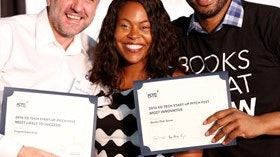Homepage
•
Learning Library
•
Blog
•
Pitch Fest spotlights ed tech innovators
Expand breadcrumbs
Expand breadcrumbs
- Learning Library
- Blog
- Pitch Fest spotlights ed tech innovators
- Homepage
- •
- Learning Library
- •
- Blog
- •
- Pitch Fest spotlights ed tech innovators
Pitch Fest spotlights ed tech innovators
By Team ISTE
June 28, 2016








